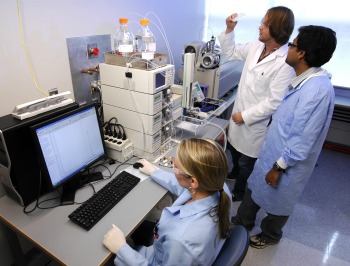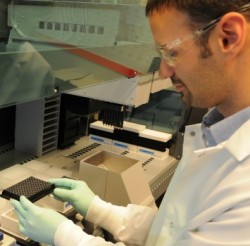
Researchers at Vanderbilt University have identified chemical compounds that could lead to a major advance in the treatment of schizophrenia.
In a transaction announced this week, Vanderbilt has licensed the compounds to Karuna Pharmaceuticals in Boston, Mass., for further development leading to human testing.
All current anti-psychotic medications act by binding to serotonin and dopamine receptors in the brain to help control hallucinations and delusions, but they provide little relief of other serious symptoms, including social withdrawal and the inability to pay attention or make decisions. As a result, many patients have difficulty holding a job or living independently. In addition, current drugs have serious side effects.
The new Vanderbilt compounds work in a fundamentally different way than existing medications, by inhibiting glycine transporter one (GlyT1), an action that allows for more normal function of brain cells involved in schizophrenia.
“[rquote]The potential of these new compounds to ameliorate the devastating social and cognitive deficits of schizophrenia, which do not respond to currently available medications, is very exciting,” said National Institute of Mental Health Director Thomas R. Insel.[/rquote]
The novel compounds were developed by Jeffrey Conn and Craig Lindsley, co-directors of the Vanderbilt Center for Neuroscience Drug Discovery (VCNDD), and their colleagues in the VCNDD, part of Vanderbilt University Medical Center.
“We are delighted to have the opportunity to partner with VCNDD to help these drugs realize their full potential, to bring a valuable new treatment to patients and families suffering with this disabling disease,” commented Karuna CEO Edmund Harrigan, former executive vice president of Worldwide Business Development at Pfizer.
Schizophrenia is a chronic disabling mental illness that affects more than 3 million Americans according to the NIMH, and 24 million people worldwide, according to the World Health Organization. The worldwide market for antipsychotic drugs exceeds $20 billion a year.
The Vanderbilt GlyT1 inhibitors were discovered and developed with support from the NIMH, which in 2010 awarded Vanderbilt a five-year, $10 million grant to establish a National Cooperative Drug Discovery and Development Group, targeting new schizophrenia therapies.
Bringing drugs to market
The work is now sufficiently far enough along to hand off to Karuna Pharmaceuticals, a Boston- based company focused on developing breakthrough therapies for schizophrenia.

It can cost over a billion dollars to bring a drug to market. Cuts in health care reimbursement for medications could make it even more difficult for pharmaceutical companies to recoup that investment. Some firms already are downsizing their research operations as patent protection ends for some of their best-selling brand name products.
That’s where academic medical centers can help. Vanderbilt is uniquely positioned to undertake early stage drug discovery, in part because of its strength in clinical pharmacology, its investment in research infrastructure including high-throughput screening, its ability to attract government, foundation and corporate support and its recruitment of top-notch scientists.
“This work shows how publicly funded basic research can foster the identification of novel medication targets and promising candidate compounds that industry can then take forward,” Insel said. “It is a wonderful example of translational research with the potential to change lives.”
Conn and Lindsley’s colleagues in the Vanderbilt Center For Neuroscience Drug Discovery on the schizophrenia program include Carrie Jones, the center’s director of in vivo pharmacology; Colleen Niswender, director of molecular pharmacology; and J. Scott Daniels, director of drug metabolism and pharmacokinetics.